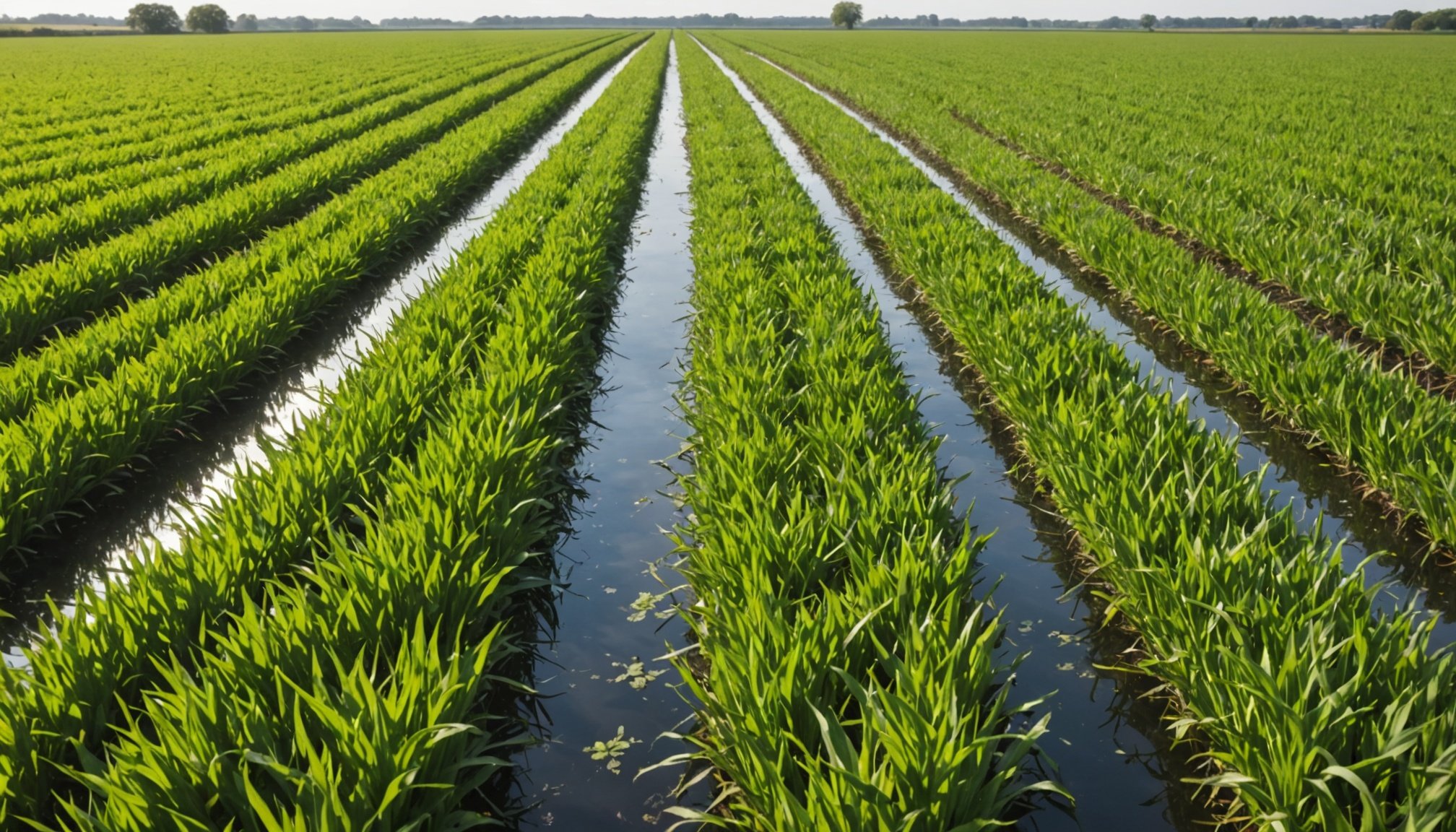Innovative Water Management Techniques
Implementing eco-friendly water management technologies is crucial for sustainable agricultural practices. Advanced irrigation systems, such as drip and subsurface irrigation, are pivotal in conserving water and enhancing resource efficiency. These innovative techniques deliver water directly to the plant roots, minimizing evaporation and waste. By reducing water use and maintaining optimal soil moisture, farmers can increase crop yields and safeguard natural resources.
Rainwater harvesting stands out as a significant practice in sustainable practices. By collecting and storing rainwater, UK farms can reduce dependency on groundwater and municipal supplies. This method not only conserves water but also moderates runoff, diminishing soil erosion and water pollution risks.
Have you seen this : Crafting Tomorrow: Cutting-Edge Marketing Tactics for Sustainable UK Breweries
Another critical component is soil moisture monitoring systems. These systems provide real-time data, enabling farmers to make informed irrigation decisions. As a result, water efficiency is enhanced, reducing waste and promoting healthier crop growth.
Adopting these strategies ensures that agricultural practices remain economically and environmentally viable. By embracing sustainable practices and innovative techniques, farmers can contribute to water conservation efforts and secure a prosperous future for agriculture. The adoption of these technologies demonstrates a commitment to eco-friendly water management and a sustainable agricultural framework.
Topic to read : How Can UK Businesses Adapt to Future Market Challenges?
Successful Case Studies in UK Agriculture
Real-world case studies in UK agriculture underscore the significant impact of adopting eco-friendly water management strategies. Numerous farms have embraced these best practices, harnessing the power of advanced irrigation systems and rainwater harvesting to boost agricultural success. By implementing such techniques, these farms have achieved notable gains in crop yield while simultaneously improving water usage efficiency.
For example, a farm in South England adopted drip irrigation combined with soil moisture monitoring systems. This approach resulted in a 30% reduction in water usage and a 20% increase in crop production over two years. The farmers shared their experiences with neighboring farms, illustrating the broader potential of these innovative practices.
Lessons learned from such case studies highlight the critical role of collaboration and knowledge exchange within the agricultural community. By encouraging open communication and resource sharing, farms can collectively enhance their sustainability efforts. The successful adoption of eco-friendly water management methods not only strengthens agricultural resilience but also fosters a sense of community and shared purpose in working towards a more sustainable future.
Government Policies and Initiatives
In the UK, several government policies and agricultural initiatives are designed to promote sustainable water management and conservation within the agricultural sector. These policies aim to facilitate the adoption of eco-friendly practices by providing necessary resources and incentives to farmers. A key focus of these initiatives includes funding programs specifically developed to support the integration of sustainability regulations in farming operations. Farmers can access grants and loans for implementing advanced irrigation technologies and best practices that enhance water conservation efforts.
The legal frameworks established by the government play a pivotal role in supporting environmental conservation. Strict regulations and guidelines ensure that farmers adhere to prescribed sustainability standards, contributing to a wider ecological balance. Moreover, these policies encourage the sharing of knowledge and resources among the farming community, promoting a culture of collaboration.
Access to information and continual training are also integral to these initiatives, enabling farmers to stay updated with the latest sustainable techniques. Such initiatives help foster a farming environment oriented towards long-term sustainability. By aligning with government policies and resources, UK farmers can significantly enhance their water management practices, thereby contributing to the overall health of the environment.
Actionable Strategies for Farmers
Implementing sustainable water management techniques requires practical steps that farmers can adopt for long-term success. Firstly, developing an implementation guide tailored to specific farm conditions can facilitate the integration of these techniques. Comprehensive farmer resources, such as instructional manuals or online webinars, provide valuable insights and practices for effective adoption.
Secondly, collaboration serves as a vital component in resource and knowledge exchange. By forming networks, farmers can align their actionable strategies, sharing equipment, expertise, and even water sources. Such cooperative efforts not only enhance individual farm sustainability but also bolster community resilience.
To maintain successful water management practices, ongoing education and training are essential. Participation in workshops and seminars ensures that farmers keep abreast of the latest innovative techniques and regulatory changes. These educational measures empower farmers, fostering a mindset of continuous improvement.
Farmers are encouraged to embrace technology such as sensor-driven irrigation systems and digital platforms for monitoring water usage. These tools offer actionable insights that facilitate informed decision-making, enhancing overall water efficiency. By prioritising collaboration and ongoing education alongside robust implementation guides, farmers can address both immediate needs and future challenges, ensuring their practices remain resilient and sustainable.
Environmental Benefits and Long-Term Outcomes
Implementing eco-friendly water management techniques offers numerous environmental benefits and promotes long-term sustainability. These sustainable practices significantly contribute to enhancing local ecosystems. By reducing water wastage, innovative methods like drip irrigation and rainwater harvesting ensure optimal water use, thereby protecting natural resources. As water becomes increasingly scarce, these practices play a critical role in conserving this vital resource.
Moreover, such practices are instrumental in climate change mitigation. By promoting efficient water usage, farms can reduce their carbon footprints, contributing positively to the environment. This, in turn, can help curb global warming effects by minimising the inputs required for agricultural operations.
The ecological impact of these methods extends beyond water conservation. Improved water management techniques can lead to better water quality and increased biodiversity within agricultural regions. Cleaner water supports healthier soil and plant growth, which fosters a more diverse range of flora and fauna. In the UK, where water pollution and biodiversity loss are pressing issues, the adoption of innovative techniques presents an opportunity to make tangible environmental improvements.
In conclusion, embracing eco-friendly water management not only secures agricultural productivity but also champions broader ecological health.

